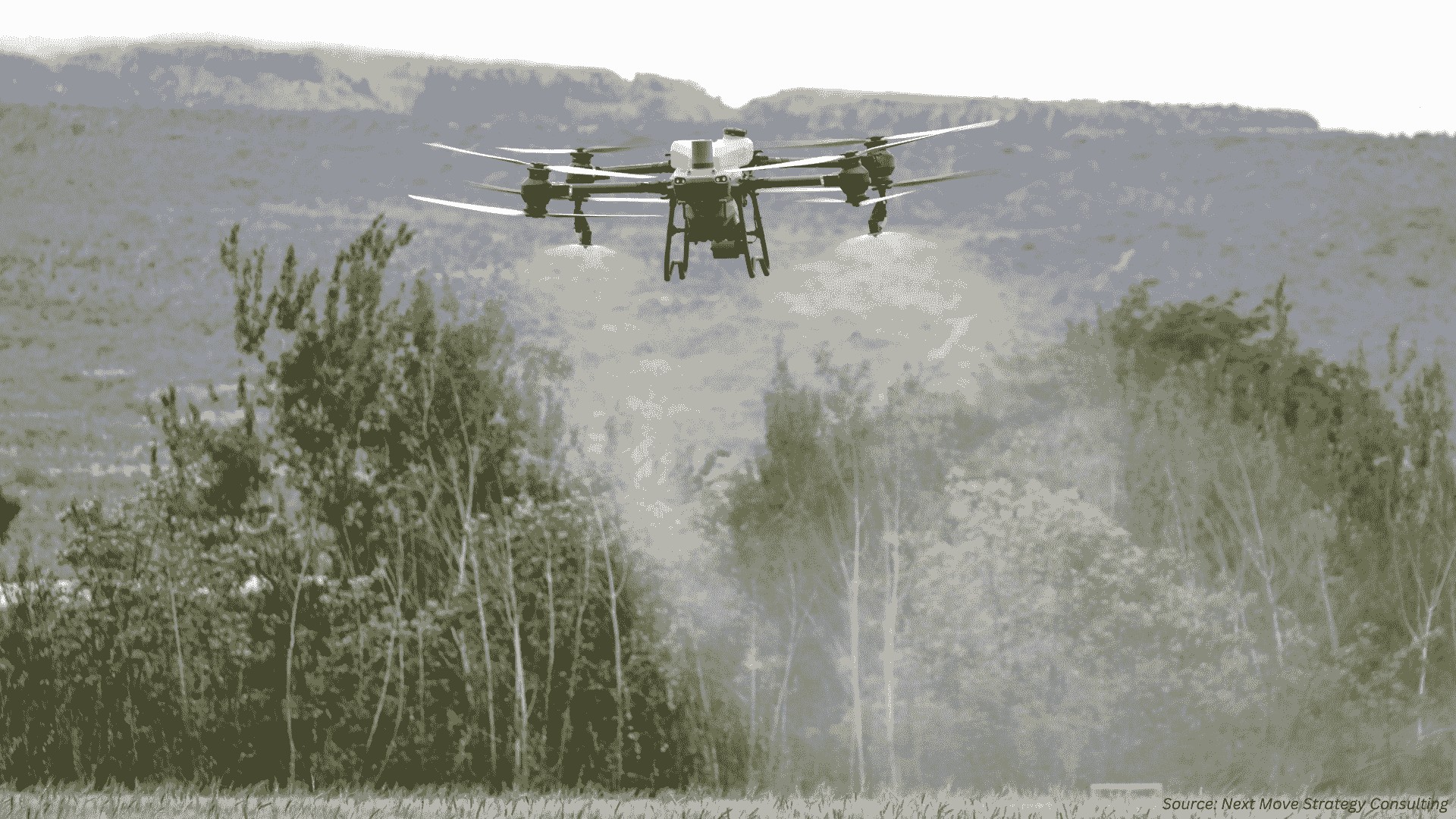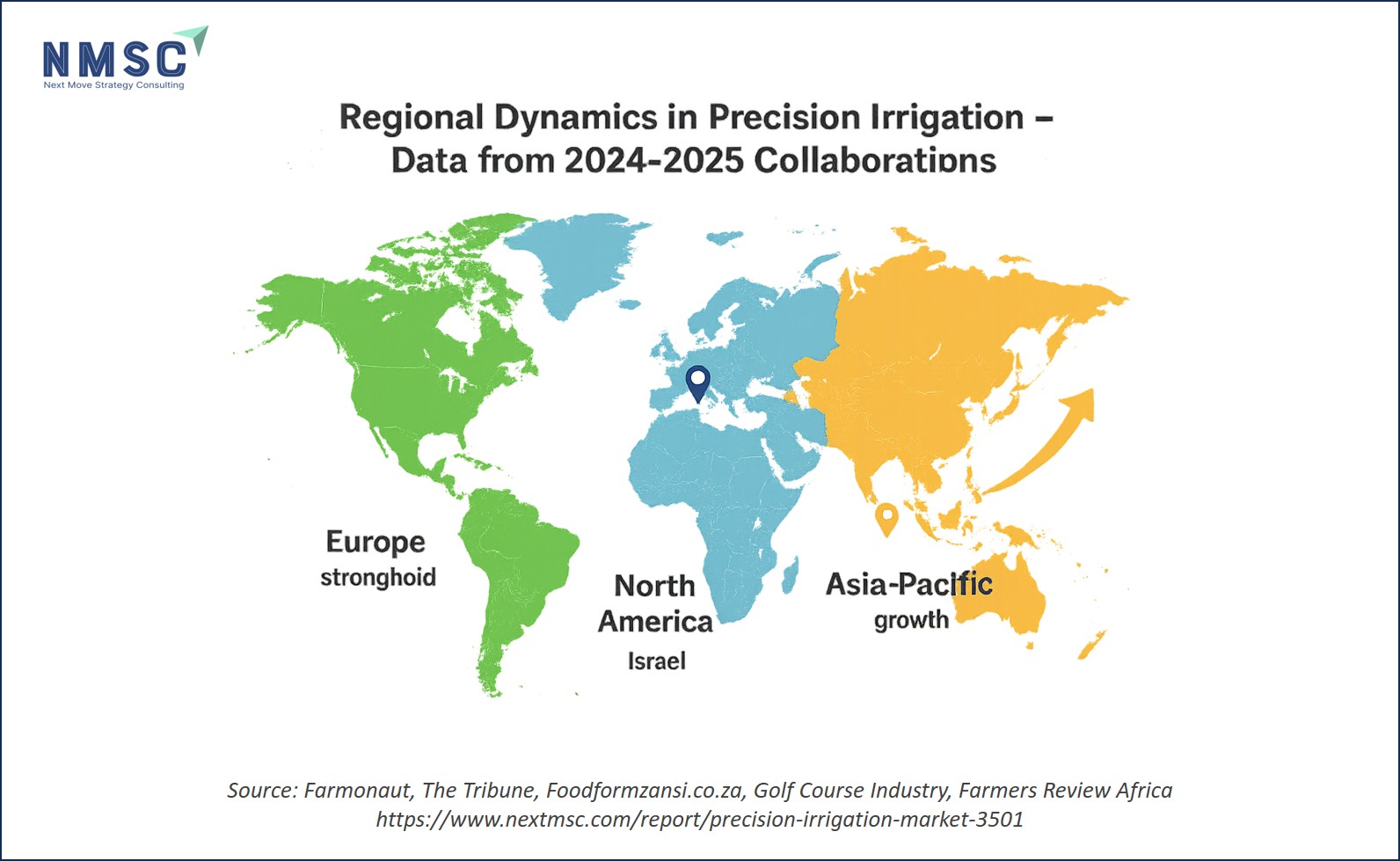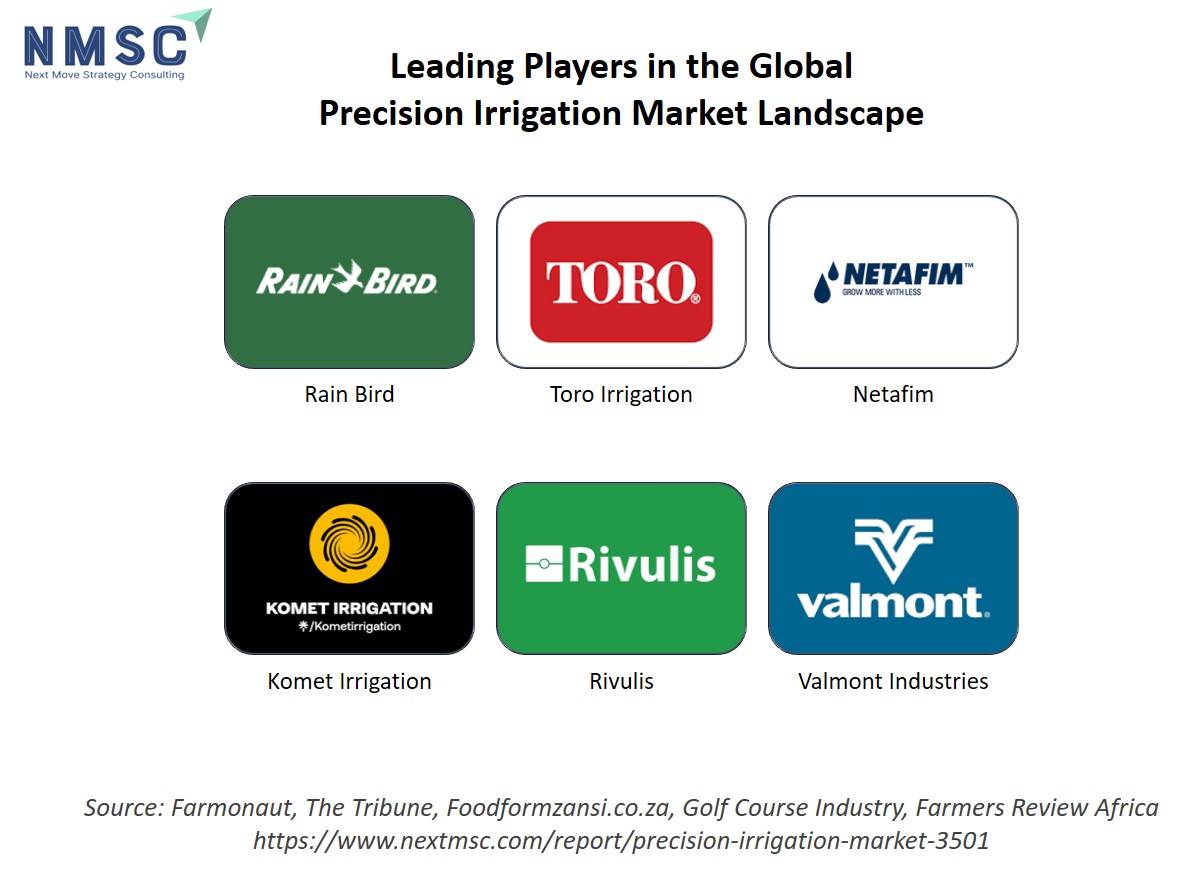Precision Irrigation Market Evolves with Smart Tech and Global Ties
Published: 2025-11-24

Precision Irrigation Market Evolves with Smart Tech and Global Ties
In an era where water scarcity challenges agriculture worldwide, the precision irrigation market is witnessing pivotal shifts toward smarter, more efficient systems. As of late 2025, innovations in AI-driven controls and drip technologies are reshaping water management, promising up to 50% reductions in usage while boosting crop yields.
This news article explores the latest strides, applications, regional dynamics, key players, and forward-looking opportunities in this vital sector.
Precision Irrigation Market: Navigating 2024-2025 Developments
The precision irrigation landscape in 2024 and 2025 has been marked by advancements in sensor integration and international collaborations. A standout development occurred on November 22, 2024, when India's Union Minister of Commerce and Industry Piyush Goyal met Israel's Minister of Agriculture and Food Security Avi Dichter in Tel Aviv. Their discussions centered on deepening ties in precision farming, drip irrigation, and desert agriculture, leveraging Israel's technological prowess for sustainable practices.
This meeting followed the signing of Terms of Reference on November 20, 2024, to kickstart negotiations for an India-Israel Free Trade Agreement, with one pillar explicitly targeting technology and innovation in agriculture. Piyush Goyal emphasized, "We have just entered into the Terms of Reference yesterday. Now we will look at all the different elements and one of the elements could be a startup bridge between Israel and India."
Another key innovation came from Toro Irrigation with the launch of Spatial Adjust, a software tool now available for order, developed in partnership with TerraRad. This tool integrates with Toro's Lynx Central Control platform, using turfRad smart sensors to map soil moisture in real time and recommend precise sprinkler adjustments. Early adopters, such as Ravenna Country Club in Littleton, Colorado, reported saving 90,000 gallons of water across 18 holes by optimizing moisture levels.
In manufacturing, Komet Irrigation set a new standard in 2025 with its state-of-the-art facility in Lienz, Austria, outpacing global sector growth through lean principles and Industry 4.0 machinery. The plant achieves sub-millimeter tolerances and zero-defect production via poka-yoke systems, reducing energy and water use in operations.
Rain Bird's systems have also advanced, incorporating AI predictive controllers and IoT sensors for dynamic scheduling, projecting up to 30% water savings by 2026. Meanwhile, Netafim expanded its footprint in Kenya, deploying drip systems that cut water use by up to 50% for both commercial and smallholder farms. These developments are profoundly impacting the precision irrigation market.
As a market research firm, we observe that such integrations of AI and international partnerships are accelerating adoption rates, potentially expanding the market by enhancing scalability for emerging economies. For procurement professionals, this signals opportunities to secure systems that not only comply with sustainability mandates but also lower long-term operational costs through predictive maintenance and resource optimization.
Applications Across Industries
Precision irrigation extends beyond traditional row crops, addressing diverse needs with targeted water and nutrient delivery. In agriculture, drip systems support high-value crops like tomatoes, onions, and leafy vegetables, ensuring uniform growth and export-quality produce. For smallholders, gravity-powered kits enable year-round production without pumps, reducing energy costs.
Horticulture benefits from Rain Bird's precision drip, which delivers water directly to roots, minimizing evaporation and achieving 60-90% efficiency—far surpassing traditional sprinklers at 40-60%. This application suits orchards, greenhouses, and vertical farms, where consistent moisture prevents root diseases.
In landscaping and urban settings, systems integrate rainwater harvesting with mobile app controls for parks, city corridors, and reforestation projects. Toro's Spatial Adjust excels in golf courses, using real-time moisture maps to maintain fairway uniformity while curbing water waste. Komet's durable components further enable reliable deployment in varied terrains, from deserts to rehabilitated mining lands.
|
Industry |
Key Application |
Benefit Example |
|
Agriculture |
Drip for vegetables/fruits |
Up to 50% water reduction |
|
Horticulture |
Root-targeted delivery |
60-90% efficiency |
|
Golf/Landscaping |
Sensor-based mapping |
90,000-gallon savings per course |
|
Urban/Restoration |
Rainwater integration |
30% overall water savings |
These applications underscore precision irrigation's versatility, allowing industrial buyers to tailor solutions for specific yield and compliance goals.
Analysis of Dominating and Fastest-Growing Regions
Europe currently dominates the precision irrigation market, bolstered by advanced manufacturing and regulatory emphasis on sustainability. Austria leads as a top country, home to Komet Irrigation's Lienz facility, which in 2025 redefined benchmarks with fully digital, lean production yielding sub-millimeter precision components. This edge stems from Austria's investment in Industry 4.0, enabling global exports with lower carbon footprints through energy-efficient designs. France follows closely, addressing its 2025 water crisis via smart irrigation and satellite alerts, integrating AI for optimized schedules amid stringent EU water directives.
In North America, the United States holds dominance through innovation hubs, exemplified by Toro's Spatial Adjust rollout, which has slashed water use in Colorado golf courses. The U.S. leads due to robust R&D funding and adoption in water-stressed states, where sensor tech aligns with federal sustainability incentives.
Asia-Pacific emerges as the fastest-growing region, driven by bilateral tech transfers. India tops this category following the November 2024 Goyal-Dichter pact, which channels Israel's drip expertise to combat desertification and scale startups—positioning India to become the "startup capital of the world" with economies of scale for affordable innovations. Israel's established leadership in desert agriculture amplifies this growth, exporting know-how that could irrigate vast arid lands efficiently.
Key Players and Recent Strategies
Leading players are fortifying positions through targeted innovations, while emerging firms scale via regional expansions.
-
Rain Bird (Leading): Focuses on AI and IoT for predictive controls, as detailed in their trend outlook projecting 30% water savings. Recent strategy includes rainwater integration via automated barrel systems.
-
Toro Irrigation (Leading): Launched Spatial Adjust in partnership with TerraRad for real-time moisture mapping, reducing manual adjustments. This enhances Lynx platform efficiency.
-
Netafim (Leading): Rolled out climate-smart drip in Kenya, saving 50% water for smallholders via dealer networks. Charles Wright, Sales Manager for SADC & East Africa, noted, “Drip irrigation is extremely efficient, cutting water use by up to 50%.” Strategy emphasizes training.
-
Komet Irrigation (Emerging): Advanced its Austrian facility in 2025 for agile, sustainable production, outpacing sector growth with poka-yoke precision. Emerging via global delivery speed.
-
Other Notable Players include Rivulis, Valmont Industries, Inc., Lindsay Corporation, Nelson Irrigation, Irritec S.p.A, and T-L Irrigation, amongst more.
These strategies link directly to enhanced product lines, aiding B2B buyers in evaluating ROI through verifiable efficiency gains.
Future Prospects and Examples
Looking ahead, the precision irrigation industry holds strong potential for resilience against climate variability in global rainwater savings by 2026. Kenya's push to irrigate 600,000 hectares by 2030 via Netafim's systems exemplifies scalable impact, turning water-scarce farms into profitable ventures. In India, the Israel partnership could spawn "deep tech" startups, scaling drip for desert crops and aligning with global ESG standards.
For industry readers, these prospects mean diversified supply chains: procurement teams can anticipate hybrid AI-drip models that integrate satellite data, as in Farmonaut's NDVI monitoring paired with Rain Bird controllers. Early movers in Asia-Pacific stand to gain 20-25% yield boosts, per Kenya's GDP-linked agriculture model.
About Next Move Strategy Consulting:
Next Move Strategy Consulting is a premier market research and management consulting firm that has been committed to provide strategically analysed well documented latest research reports to its clients. The research industry is flooded with many firms to choose from, what makes NMSC different from the rest is its top-quality research and the obsession of turning data into knowledge by dissecting every bit of it and providing fact-based research recommendation that is supported by information collected from over 500 million websites, paid databases, industry journals and one on one consultations with industry experts across a diverse range of industry sectors. The high-quality customized research reports with actionable insights and excellent end-to-end customer service help our clients to take critical business decisions that enables them to move beyond time and have competitive edge in the industry.
We have been servicing over 1000 customers globally that includes 90% of the Fortune 500 companies over a decade. Our analysts are constantly tracking various high growth markets and identifying hidden opportunities in each sector or the industry. We provide one of the industry’s best quality syndicate as well as custom research reports across 10 different industry verticals. We are committed to deliver high quality research solutions in accordance to your business needs. Our industry standard delivery solutions that ranges from the pre consultation to after-sales services, provide an excellent client experience and ensure right strategic decision making for businesses.
For more information, please contact:
Next Move Strategy Consulting
5th Floor 867
Boylston St, STE 500,
Boston, MA 02116, U.S.
E-Mail: [email protected]
Direct: +18577585017
Website: www.nextmsc.com
About the Author
 Sneha Chakraborty is a passionate SEO Executive and Content Writer with over 4 years of experience in digital marketing and content strategy. She excels in creating optimized, engaging content that enhances online visibility and audience engagement. Skilled in keyword research, analytics, and SEO tools, Sneha blends creativity with data-driven insights to deliver impactful results. Beyond her professional work, she enjoys reading, sketching, and nature photography, drawing inspiration from creativity and storytelling.
Sneha Chakraborty is a passionate SEO Executive and Content Writer with over 4 years of experience in digital marketing and content strategy. She excels in creating optimized, engaging content that enhances online visibility and audience engagement. Skilled in keyword research, analytics, and SEO tools, Sneha blends creativity with data-driven insights to deliver impactful results. Beyond her professional work, she enjoys reading, sketching, and nature photography, drawing inspiration from creativity and storytelling.
About the Reviewer
 Sanyukta Deb is an accomplished Content Writer and Digital Marketing Strategist with extensive expertise in content strategy, SEO, and audience engagement. She specializes in building strong brand visibility through data-driven campaigns and impactful, value-added researched content. With a passion for creativity and innovation, she blends strategic thinking with design and communication to craft meaningful digital experiences. Over the years, she has contributed cross-functional marketing projects, driving measurable impact and audience engagement.
Sanyukta Deb is an accomplished Content Writer and Digital Marketing Strategist with extensive expertise in content strategy, SEO, and audience engagement. She specializes in building strong brand visibility through data-driven campaigns and impactful, value-added researched content. With a passion for creativity and innovation, she blends strategic thinking with design and communication to craft meaningful digital experiences. Over the years, she has contributed cross-functional marketing projects, driving measurable impact and audience engagement.














Add Comment